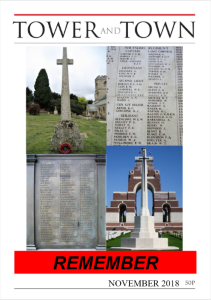

Tower and Town, November 2018 (view the full edition) (view the full edition)Clergy LetterThe Soldier eyed him upward, limb by limb, (Siegfried Sassoon)
The young poet and soldier, ‘Mad Jack’, not so long ago a pupil at Marlborough College, now stands before a life-size Crucifix in a small French village during the First World War and envies Christ’s wounds. Such wounds would send a soldier back home – back to Blighty – but there Christ remains, suffering for the sake of a broken world. Sassoon’s poem captures a theological reality of significant importance. God suffers with the world, even as he takes great joys in its joys. The First World War ushered in an age of Secularism and the Christian faith, in particular, came under critical attack even as the devastating reality of that seemingly endless conflagration dragged along. In an urgent manner, the Western World pleaded for an answer to a question centuries old. Why does a loving God, both all-knowing and all-powerful, allow such horrific suffering within and among His creation? What kind of God is this, if a God at all? It would appear that God asks us to find meaning in the suffering and, still more, his own presence. And although that meaning might feel somewhat inadequate, it is a reminder of the presence of the ‘Paraclete’, the Holy Spirit who moves even above the din of the battlefield, ever present among a suffering creation. I worked as a Hospital Chaplain and I can never forget a story told to me by my Pastoral Supervisor at the time. Himself a Unitarian Minister and long-standing chaplain, I had asked Rahj how he understood suffering in the context of a loving God. He told me a simple story. I find it adequate I suppose on one level, but still perhaps not quite. And maybe that’s the closest I can get. Rahj was called in ‘early doors’ on a Sunday morning to visit the bedside of a young boy who had been horribly burned in a house fire. Perhaps mercifully, he didn’t have much longer, but Rahj said he did what he could for the lad and for his family. Settling down beside his hospital bed, he read the words of the Twenty-third psalm. And as he read, a single tear rolled down the charred cheek. In that tear, Rahj told me, God was present. True in 1916 and true, I suppose today – even in our madness and pain, God never abandons us. That’s the best I can say. Tim Novis |